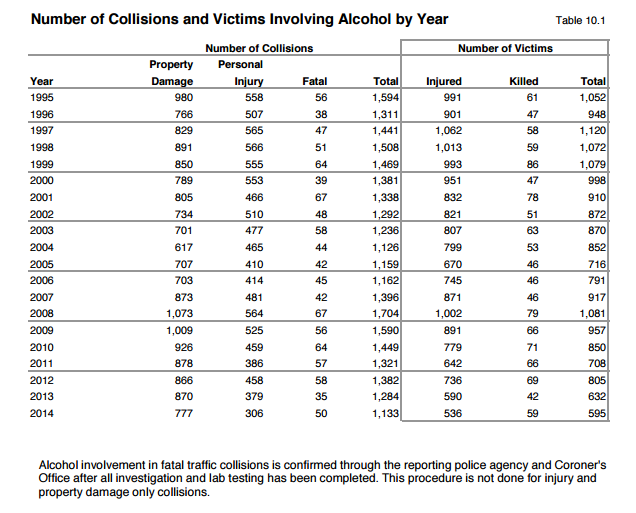For years, Saskatchewan has been home to the worst records on impaired driving in Canadian provinces. While fatal collisions continue to make the news and advocates speak out against driving drunk, the numbers have not dropped.

It is a culture in Saskatchewan, one that many are fighting to change.
Three lives lost, countless lives affected
In April 2016, a 24-year old husband and father, Jesse Taylor, was sentenced to 4 years in prison.
On September 15, 2013 he drove a company truck loaded with five of his friends up Highway 2, heading to Moose Jaw.
The group had been drinking heavily during the day, adding cocaine and marijuana into the mix at a house party in Mossbank.
It was decided that Taylor would drive home. At his sentencing, it was revealed that he veered off the road, over corrected, and the truck skidded sideways until the tires bit and the truck flipped down a steep embankment. Four of the young men were ejected before the truck came to a rest on a barbed wire fence.
Josh Patterson, Justin Kowalski and Jason Friesen were killed. A fourth man, Cody Johnson, was in a coma for two months and is still recovering.
Merv Nidesh, Taylor’s defence lawyer, said there were no winners in the case.
“It’s heart wrenching, it’s gut wrenching. They’re difficult cases, they really are,” he said.
Court heard that Jesse Taylor was a good man. He was well loved by family and friends and was a hard worker. Even the victim’s families, like Jason Friesen’s father Ken Karmarznuk, showed sympathy for Taylor after his sentencing.
“We don’t want to ruin the kid’s life, an accident is an accident. They didn’t do it on purpose,” he said immediately following the sentencing.
A trend unbroken
Saskatchewan has consistently doubled the national rate of deaths caused by impaired driving and nearly tripled the national rate for reported incidents.

Get breaking National news
In 2014, the most recent year provincial statistics are available, impaired driving killed 59 people on Saskatchewan roads. The average number of people killed each year over the past 20 years is 59.

Each collision and each death is a tragedy with a ripple effect on countless connected lives.
READ MORE: Saskatchewan has highest percentage of impaired drivers
Enforcement spread too thin
Sgt. Ryan Case has worked for RCMP Traffic Services for 15 years, his main role is reconstructing vehicular collisions. He has seen the aftermath of countless impaired driving collisions, including the grief endured by the victim’s relatives.
“We’re holding them back. They want to get down to their loved one, but we’re holding them back saying, ‘this is not how you want to remember or see them’. ”
They are experiences no one, no matter how seasoned, can get used to.
“It’s not even frustrating it’s… I don’t even know what to call it to be honest. But it’s just an awful experience.”
For years, law enforcement has struggled to put a dent in the statistics that haunt the province.
According to the Ministry of Highways and Infrastructure, there are 26,000 km of provincial highways. Including municipal roads, Saskatchewan’s total road surface is 160,000 km.
Intercepting drunk drivers in a province whose roads could circle the equator four times is next to impossible, especially in rural areas.
“How many more are out there? Impossible to estimate. But we have to be honest that not everyone is being intercepted by law enforcement,” said Case.
“I thought I was invincible”
If impaired driving collisions are 100% preventable, why do they happen so often? That is a question Ted Gross asks himself every day.
“That night, to me, was just another night”
In 1998, Gross was like many other 21-year old men. He had a job and many friends. He also liked to drink, oftentimes, too much.
One night, he blacked out at a Regina bar and got behind the wheel.
“I’d done it before and nothing bad would happen that night. I thought I was going to wake up the next day, go about my life. I woke up the next day in a jail cell.”
The collision took the life of 21-year old Melissa Hoeving.
WATCH: DIGGING DEEPER: ‘She lost her life because of my stupid choice.’
Gross was sentenced to three and a half years in prison. He calls it a “light sentence”.
He said he would give himself many excuses internally to justify driving home, and believes they are the same that many people give themselves today.
“You don’t hear it so much publicly, but behind closed doors people sort of go, ‘well, no one got hurt so let’s not make a mountain out of a mole hill’,” he said.
“You never intend to do this. But I stole an innocent life for no reason. All because I thought I was invincible.”
Since serving his sentence, Gross says he has not consumed alcohol and often speaks at Saskatchewan schools to share his story.
Changing the culture
In 2014, Saskatchewan introduced stiffer penalties for impaired driving, including longer license suspensions and immediate roadside vehicle seizures for certain scenarios.
WATCH: Digging Deeper: Do stiffer penalties translate into fewer impaired drivers on Sask. roads?
Experts say progress won’t be made in courtrooms, but rather classrooms.
“Court decisions are not as successful in deterring people as education is,” said Nidesh.
“It’s not just about apprehending or catching or arresting and laying charges,” said Sgt. Case. “If we can prevent this stuff from happening in the first place, that’s a win in our book.”




Comments